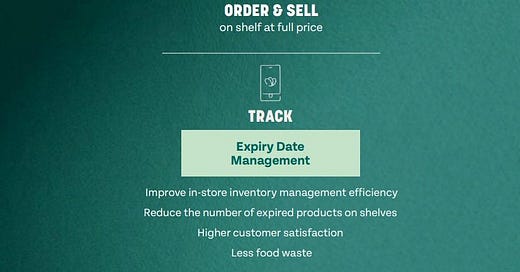Too Good To Go: A Catalyst for Sustainability with Measurable Impact
Continuing the topic of Too Good To Go, this week, let's explore the real-world consequences of how they have positively influenced our communities.
As we have seen from last week's article, Too Good To Go has emerged as a powerful force in the global fight against food waste, demonstrating its commitment to sustainability on multiple levels. Beyond its core function of reducing food waste, the company has successfully created a business model that promotes environmental, economic, and social sustainability, supported by impressive results outlined in their recent report and additional insights.
The environmental impact of food waste is profound, contributing to greenhouse gas emissions, deforestation, and the wasteful use of resources. By saving an astounding 143 million meals from being wasted as of 2023, Too Good To Go has made a significant contribution to reducing environmental harms. This translates to a staggering 358,000 tons of CO2e emissions avoided, highlighting the platform's power in combatting climate change.
In addition to its environmental benefits, Too Good To Go also generates economic value. The platform offers cost savings for both consumers and businesses. For consumers, the app provides access to high-quality food at a reduced price, with discounts typically ranging from 50% to 70% off the original cost. For businesses, it offers a way to recover some of the costs associated with surplus food, turning a potential loss into a new revenue stream.
Traditional processes for expiry date checks and in-store discounting can be lengthy, resource-intensive, and error-prone, especially at scale. According to the European Grocery Retailing Institute, costs associated with food waste amount to an average of nearly 2% of grocery retailers' net sales, almost equaling their average margins. Too Good To Go Platform has proven to be a valuable solution in addressing these challenges.
Key benefits of Too Good To Go Platform for businesses:
Revenue Recovery: Too Good To Go has helped partners recover $980 million in revenue by drastically reducing excess inventory.
Efficiency Gains: With the near-expiry shortlist generated algorithmically, manual checks are reduced to 1-7% of all products.
Time Savings: On average, Too Good To Go Platform helps grocery retailers save up to 1 hour per employee, per day.
Too Good To Go Platform currently integrates five modules in a single interface, offering partners a pick-and-choose modular solution to tailor their surplus food management strategy. These modules include:
Expiry Date Management
Recommendations
In-Store Discounting
Consumer Marketplace
Donations
By leveraging these modules, businesses can optimize their operations, reduce waste, and improve their bottom line.
Beyond its environmental and economic impact, Too Good To Go also contributes to social sustainability. By fostering community connections and promoting food security, the platform encourages people to think more consciously about food waste and take action in their own communities. This is especially important in low-income communities, where food insecurity is a pressing issue.
To amplify its impact, Too Good To Go has formed strategic partnerships with a wide range of stakeholders. These collaborations include partnerships with businesses, governments, and non-profit organizations. By working with thousands of businesses across Europe, Too Good To Go has expanded its reach, making it easier for 17.6 million users to access surplus food and for businesses to reduce their waste.
The company has also actively engaged with governments to support policy goals aimed at reducing food waste. These collaborations demonstrate the potential for public-private partnerships to address complex social and environmental challenges.
Furthermore, Too Good To Go has partnered with non-profit organizations to enhance its social impact. By working with food banks and charities, the company has been able to distribute surplus food to those in need, further expanding its reach and addressing the social dimensions of food waste.
As Too Good To Go continues to grow, its impact on sustainability is likely to increase. The company's innovative approach and commitment to creating a more sustainable food system make it a key player in the global effort to reduce food waste, with real results that demonstrate its effectiveness in both environmental and economic terms. The success of Too Good To Go highlights the importance of efficient management systems and platforms in driving positive change, demonstrating how technology can be a powerful tool for addressing complex societal and environmental challenges.
Sources:
Too Good To Go, "Annual Impact Report," 2023.




